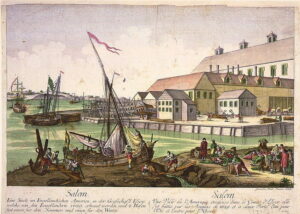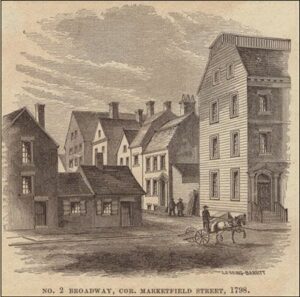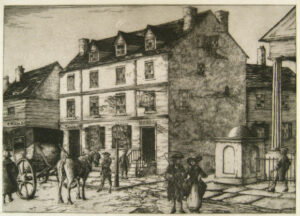Americanism Redux
May 18, on the journey to the American Founding, 250 years ago today, in 1773
The river is running fast.
(Salmon Falls River)
Away from the rushing current mid-stream, two figures float in the water. They drift and turn slowly in the water that laps up to the bank. They are two bodies, the corpses of Lucy Lord and Jonathan Hardison. The pine trees stand in silence, except for whistling made by the breeze through the needles.
Lucy and Jonathan have been missing since yesterday. With them, that makes three dead.
Seven people went out in a boat on the Salmon Falls River in New Hampshire. A horrific storm surprised them, wild with thunder, lightning, wicked winds, and sheets and walls of driving rain. The boat capsized near the juncture of the river with the smaller Sturgeon River. Four have survived. Not far away, barns lay flattened on the soaking ground. Whatever didn’t die in the collapse of heavy beams, planks, and shingles is wandering around wet—a chicken or two, a hog or two, a cow or two.
Today, above the two bodies laying on the river bank, over the pines erect in the forest, clouds roll by. A knowing eye reads them well.
White and puffy on top, flat and darkened along the bottoms, they’re the clouds on a mostly clear day that follow bad weather. The air is almost cuttingly fresh and the wind blows sharp, making ripples on the swift current in the strong and rough river.
The crisp and clearing weather is also a stage in Stonington, Connecticut where sixty people stand on a hillside in a semi-circle. They hear a man speak. He’s speaking to them. The sixty people belong to the Pequot tribe and live on the Eastern Pequot Reservation in Stonington. The speaker is Reverend Joseph Fish. He’s the minister for a funeral of a member of the Pequot tribe, Samuel Apess, who died a few days ago. Fish’s ministry has a sort of specialty to it—he’s not only a missionary to Natives but he’s a researcher of multi-racial marital and sexual relationships. Fish has tried to understand the ways in which family, sex, and love cross racial categories and boundaries. The text for Fish’s sermon at Apess’s funeral is Colossians 1:27: “To them God has chosen to make known among the Gentiles the glorious riches of this mystery, which is Christ in you, the hope of glory.” Fish tells of Jesus’s inclusion of Jews and non-Jews alike, with no interest in the ways people separate themselves from one another. Yes, truly, it’s a mystery.
(Lantern Hill, the Pequot Reservation)
Boundaries are the topic in the town hall meeting in Salem, Massachusetts which, today, 250 years ago, declares itself opposed to any further continuance of the overseas trade in enslaved African people. It’s “repugnant to the natural rights of mankind, and highly prejudicial to this Province (of Massachusetts).” Similar statements flash in various town hall meetings in the British colony of Massachusetts, rather like last night’s lightning streaks in the stormy sky.
(Salem)
There’s no storm for Benjamin Kissam as he sits in his law office in New York City with a stack of documents on his desk. One by one, he draws papers from the stack. He’s reading estate cases he’s been handling for clients. Each case has a few letters of inquiry from other people with claims on the estate. They’re seeking answers, guidance, or relief from Kissam, one of the city’s best lawyers. Kissam’s past clients include the Mohawk tribe who engaged him to recover lands lost to the British, Dutch, and French colonizers. Kissam is also well-regarded for his willingness to train young, new lawyers. Some of his students—a young man named John Jay, in particular—regard him as a fatherly figure and will hold him in high esteem for the rest of their lives. Kissam loves judicial law, loves the proceedings where judicial law is dispensed, and loves the people who take judicial law as seriously as he does. Every problem, he believes, can be settled in law.
(Kissum’s New York City)
In Boston, Samuel Adams embraces a higher law than any made by people, but there’s one person who occupies his mind today. He’s puzzling over his colony’s British royal governor, Thomas Hutchinson. The colonial legislature will open its new session next week and Adams worries about Hutchinson’s likely conduct. Rumors say the governor will “bring about a Coalition of parties” that will worsen the “oppression” of local colonists. Adams wishes secret letters written by Hutchinson could be made public. He believes they’d reveal the governor’s true nature. They also hint at likely additional information. “I wish we could see the Letters he has written since his Advancement to the Government,” remarks Adams. There’s scarcely any single waking hour of Adams’s day that isn’t filled with his focus on Hutchinson.
(the light always seen in Adams’s head)
Also
Tonight in Philadelphia, 250 years ago, a special event occurs. It’s the “Philadelphia Assembly.” Modeled after a British tradition in London, the Philadelphia Assembly is combined dance, dinner, and featured entertainment for invited and subscribed guests only. You want to go because no one else gets to go. Strict rules guide every minute. Attire has a rule. Dance moves have a rule. Order of music has a rule. Attendees’ demeanor has a rule. Conversation has a rule. How and what you eat and drink has a rule. Games you play have a rule. In this place no purpose exists other than pleasure, orderliness, and the absence of problems, all of which is ensured by obedience to the rules. The event is an other-worldly affair that borders on make-believe, a living show performed by scripted characters pretending to be themselves from the real world. Or perhaps it’s the real world pretending to be imaginary. Whichever it is, only the wealthy, the connected, the insiders, the networked, and the interlaced will be in attendance.
(City Tavern, site of the Philadelphia Assembly)
For You Now
Strange pairings, aren’t they?
The day starts with two dead bodies on a wooded riverbank and ends with an out-of-body social scene in a cosmopolitan city.
A deceased Native man from a remnant of a once-ruling tribe, preached over by a white man with a sociological fascination for multi-racial offspring.
A lawyer who has defended Native clients mentoring aspiring members of a judicial system that overlooks the rights of Natives.
A radical colonial-rights supporter with major advances in protest who worries over an imperial governor portrayed as fiendishly powerful and impervious to colonial-rights pressures.
The things that don’t fit until they do fit. And in that shift, in that evolution and rotation in finding the proper match and alignment, time will pass and timing will prevail. Time and timing act as the defining forces. When seen from a distance, all appears as scripted and ordained as the dance of dolls in the playhouse. But in the moment, when time and timing pass far overhead like the clouds after a storm, no one can tell what is already known. The waters run strong in the main current, while the eddies of counter-current circle and turn back toward the bank, carrying whatever floats on the surface.
Suggestion
Consider for yourself those things that don’t match up together in our nation today. The pair that doesn’t seem to fit—what’s the biggest one to you?
(currents and eddies)














